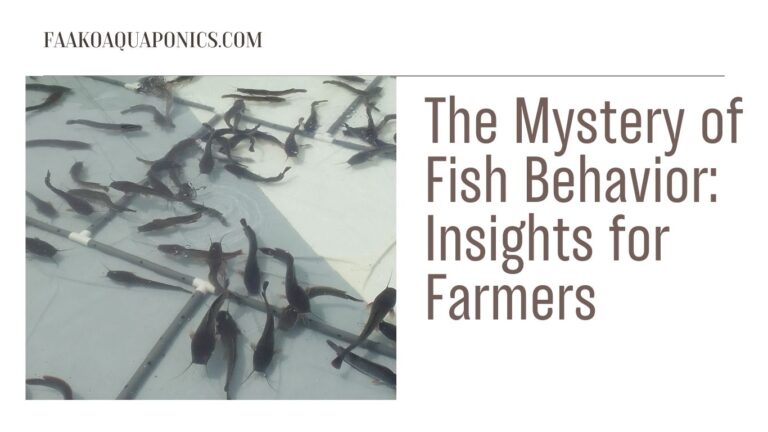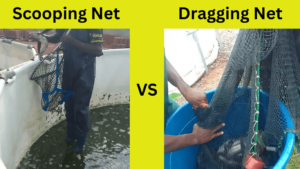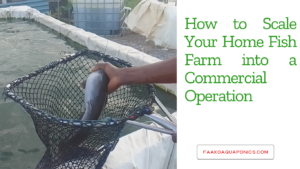The mystery of fish behavior is essential for fish farmers to know as they seek to optimize their farming practices and ensure the well-being of their fish.
Fish adapt and react to various factors, including environmental conditions, social dynamics, and innate instincts. Such adaptability and reaction is what we referred as the mystery of fish behavior.
In this article, we shall make you understand the fascinating world of fish behavior. Unveiling its mysteries and providing valuable insights for farmers.
1. The Importance of Understanding Fish Behavior
The mystery of fish behavior affects every aspect of aquaculture, from feeding patterns and growth rates to disease management and reproduction.
By comprehending the behavior of their fish, farmers can make informed decisions to enhance productivity, minimize stress, and promote overall welfare.
2. Social Behavior
Fish are social creatures, exhibiting intricate social structures and hierarchies within their communities. Understanding these dynamics is crucial for farmers to ensure harmonious coexistence and minimize aggression among fish populations.
3. Feeding Behavior
Fish exhibit diverse feeding behaviors depending on species, size, and environmental conditions. Some species like catfish are opportunistic feeders, while others are more selective.
Most fish in the fish ponds prefer to be fed in the morning or when the weather is still cool. But some also prefer otherwise. So also study what your fish is like. But generally, try always to feed your fish at the right time. It’s not too early and not too hot.
Also, try to maintain a single way of feeding. Whether you are using the spot method or broadcasting method, maintain one. The fish often react to what they are used to when you are feeding them. All these are the mystery of fish behavior.
By observing feeding behavior, farmers can optimize feeding strategies to maximize growth and minimize waste.
4. Environmental Responses
Fish are highly sensitive to changes in their environment. They may alter their behavior in response to factors such as water temperature, pH levels, oxygen levels, and light intensity.
As part of the mystery of fish behavior, sometimes fish in the pond react to the environment which is even outside their fish pond. For example, catfish in the pond even react to sound. The sound could be a vehicle or machinery. Even during feeding, sometimes I just stand and hit the container containing the feed and the fish rush to their feeding point. They even respond when you hit their fish pond which is a tarpaulin pond.
Understanding these responses allows farmers to create optimal conditions for fish growth and health.
5. Reproductive Behavior
When people visit my fish farm, they mostly ask, do they bread in the water? How do they give birth? The simple answer I usually give is NO.
Fish, especially catfish are not bred in the fish pond where they are being reared because the conditions are not favorable. Catfish are carnivorous and even when the brooder lays the eggs, other fish will consume the eggs.
Often, fish farmers who breed fish separate the female fish known as brooders, and take them through medication and other procedures. The fish then lay the eggs in a quarantine manner. They hatch into fry and then to fingerling before they sell to those of us who will rear them to the maturity stage.
By understanding the reproductive cycles and behaviors of their fish, farmers can implement appropriate breeding practices to maximize reproductive success.
6. Movement Patterns
Fish exhibit various movement patterns, including schooling, shoaling, and solitary behavior. Schooling behavior, where fish swim together in coordinated groups, offers advantages such as protection from predators and increased foraging efficiency.
Understanding these patterns can help farmers design aquaculture systems that promote natural behaviors and minimize stress.
7. Stress Indicators
Stress can have detrimental effects on fish health and productivity. Common stressors in aquaculture include overcrowding, poor water quality, and handling.
Farmers must be able to recognize stress indicators such as changes in swimming behavior, loss of appetite, and increased susceptibility to disease.
By minimizing stressors and promptly addressing issues, farmers can maintain optimal conditions for their fish. This also helps us understand the mystery of fish behavior.
8. How to Control Strange Fish Behavior in Aquaculture
After understanding the mystery of fish behavior, farmers can implement strategies to optimize their aquaculture operations:
Habitat Design
Designing aquaculture systems that mimic natural environments can promote natural behaviors and reduce stress. You can also put hidden places in the fish ponds. These could be woods or logs to serve as hiding places for the fish.
Feeding Management
Tailoring feeding regimes to match the feeding behavior of fish species can improve feed conversion ratios and reduce waste. Have a fixed time of feeding your fish to avoid or reduce cannibalism.
Water Quality Monitoring
Regular monitoring of water quality parameters allows farmers to maintain optimal conditions for fish health and behavior. For fish, water is life. Joke with the quality of your water and you stand the chance of losing all the fish. Choose the water source which is good for fish.
Always check the water quality such as pH level, oxygen level, ammonia, and other parameters.
Stocking Density
Avoiding overcrowding helps prevent aggression and competition for resources among fish populations. Understocking too reduces the profit margin. So always struck a balance in between. Know the capacity of the fish pond and always stock the right quantity.
Handling Techniques
Gentle handling techniques during activities such as harvesting and grading can minimize stress and injuries. Also, be gentle during the transportation of live fish. Be gentle during sorting and always sort when the weather is not hot like in the morning.
9. Conclusion
Understanding the mystery of fish behavior is a fundamental aspect of successful aquaculture. By unraveling the mysteries of fish behavior, farmers can optimize their farming practices, enhance productivity, and ensure the well-being of their stocked fish.
By implementing insights gained from studying fish behavior, farmers can move closer to achieving sustainable and profitable aquaculture operations.




A motivating discussion is worth comment. I do believe that you ought to publish more on this subject matter, it might not be a taboo subject but generally people don’t discuss such topics. To the next! Best wishes.
An outstanding share! I’ve just forwarded this onto a co-worker who had been doing a little research on this. And he in fact ordered me breakfast because I found it for him… lol. So allow me to reword this…. Thank YOU for the meal!! But yeah, thanx for spending time to discuss this issue here on your blog.
You’re so interesting! I don’t suppose I have read through anything like this before. So good to discover someone with original thoughts on this topic. Really.. many thanks for starting this up. This site is something that is required on the web, someone with some originality.
Your style is unique in comparison to other people I have read stuff from. Many thanks for posting when you have the opportunity, Guess I’ll just book mark this page.
Having read this I believed it was extremely enlightening. I appreciate you taking the time and energy to put this information together. I once again find myself personally spending a significant amount of time both reading and leaving comments. But so what, it was still worthwhile!
When I originally left a comment I appear to have clicked on the -Notify me when new comments are added- checkbox and from now on each time a comment is added I receive 4 emails with the same comment. Perhaps there is a way you are able to remove me from that service? Kudos.
Hi there! I just would like to offer you a big thumbs up for the great info you have got here on this post. I’ll be returning to your blog for more soon.
Hi, I think your website could possibly be having browser compatibility problems. Whenever I look at your site in Safari, it looks fine but when opening in IE, it has some overlapping issues. I merely wanted to provide you with a quick heads up! Other than that, fantastic site.
Way cool! Some extremely valid points! I appreciate you penning this article and the rest of the site is also very good.
Aw, this was a really nice post. Finding the time and actual effort to make a very good article… but what can I say… I put things off a lot and don’t seem to get nearly anything done.
It’s hard to find well-informed people for this topic, but you sound like you know what you’re talking about! Thanks
Hello there I am so grateful I found your website,I really found you by mistake, while I was searching on Aol forsomething else, Anyways I am here now and would just like to saymany thanks for a incredible post and a all round entertaining blog (I also love the theme/design), I don’t have timeto read it all at the minute but I have book-marked it and also included your RSS feeds, so when I have time Iwill be back to read much more, Please do keep up the awesome job
I like this website it’s a master piece! Glad I detected this on google..
You really make it appear so easy along with your presentation however
I in finding this topic to be really one thing that
I feel I would never understand. It kind of feels too complex and extremely huge for me.
I am having a look ahead to your subsequent publish, I’ll attempt to get the hang of it!
Najlepsze escape roomy